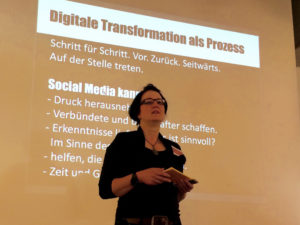- Best-effort principle – the basis of equality online
- Shaping the legal framework: room for innovation and new services
- Clear rules provide security for Internet stakeholders, business models and consumers
On 27 October 2015, the European Parliament passed the Telecom Single Market (TSM) packet of directives. As well as the decision to waiver most roaming charges within the Single Market, the TSM package includes legal rules that guarantee net neutrality. eco – Association of the Internet Industry has just published a debate paper on the directive, which came into force on 30 April 2016.
The term net neutrality describes a basic underlying principle of data traffic in the Internet: that all data packets – regardless of their content, application, origin, and destination – are treated absolutely equally and should be transferred from A to B as quickly as possible. “Irrespective of whether we want to send an email or huge amounts of data, the principle of net neutrality means that no preference is given to any of the data packets being transferred,” says Oliver Süme, eco Head of Policy & Law, explaining the idea behind net neutrality. “If this principle of equality were to be abolished, then the Internet would no longer be what it is today.”
Best-effort principle – the basis of equality online
Data transfer in the Internet is not done over reserved lines, as in telephone communication, but rather over freely-available network infrastructures. Routers decide when to send which data package based on the first in/first out principle, FIFO for short, and treat the transferred data completely neutrally. “This best-effort procedure is the foundation of an open and discrimination-free Internet,” Süme added. “However, we need to keep the time-critical or broadband-intensive services in mind in the dynamic development of the networks, and look for fair solutions.” The economic efficiency of the currently available network infrastructure plays a role, as does the question of whether content and service providers which require high levels of broadband usage for commercial products like video platforms, games, or streaming services should contribute financially to the expansion of broadband.
Shaping the legal framework: room for innovation and new services
Such “special services”, which would give certain content a privileged “fast lane”, could violate the basic principle of net neutrality and lead to distortion of competition. This has been the subject of much heated discussion in EU Internet policy in recent years. After much debate, the European Council, the European Parliament and the European Commission finally found a political compromise, which has been included in the current telecommunications package. This proposed compromise sets the legal framework, which, however, first needs to be clearly defined and shaped.
“With this compromise, the key elements of the legal evaluation and shaping of special services have been fixed. However, many questions remain unanswered. As far as we are concerned, it is not yet clear how offences against net neutrality will be brought to light and how they will be dealt with,” eco commented the directive. “For example, research still needs to be done on whether discrimination can also occur at the interconnect points.” How exactly “quality Internet access in keeping with current standards” and “appropriate traffic management”, both called for by the German government, are to be implemented, will only become clear over time in everyday regulatory practice. “We assume that the consultations of the Body of European Regulators for Electronic Communication (BEREC) and the national regulators, planned for the end of August 2016, will bring more clarity. This is essential from the consumer point of view,” Süme summarized.
Clear rules provide security for Internet stakeholders, business models and consumers
The more precisely these special services are defined and demarcated from other services, the higher the chances of equality in net neutrality. “We favor a fair solution to the conflict, which the current compromise proposal represents, particularly with the many start-ups and innovative business models in mind, which enrich the Internet market with new impulses. The current directive is an important step in creating the long-called-for legal framework for quality-assured IP services, without discriminating against other services and applications in the open Internet. Now it needs to be further defined and supplemented with binding guidelines, so that not only transparency, but also healthy competition in the Internet can both flourish in the long-term.” This is one of the demands in the current debate paper which eco published on the occasion of the new net neutrality directive coming into force on 30 April 2016.
The eco debate paper on net neutrality can be downloaded here:
English: https://international.eco.de/wp-content/blogs.dir/2/files/net-neutrality.pdf
German: https://www.eco.de/wp-content/blogs.dir/20160429_eco_deb_netzneutralitaet.pdf




